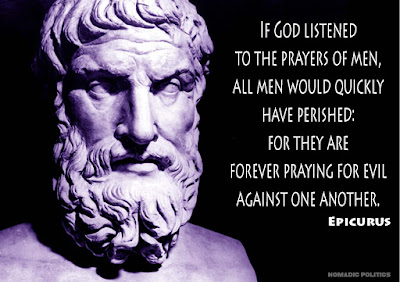by Nomad
 The lost philosophy of one ancient Greek offers an answer to what's gone wrong with modern society.
The lost philosophy of one ancient Greek offers an answer to what's gone wrong with modern society.
Quest for a Happy Life
The ancient Greek philosopher Epicurus lived about 300 years before Christ. His writings survive in mostly in notes collected by later biographers. It's enough to understand, in a general way, the philosophy he taught back then and why the ancients thought so much of the man and his ideas.
According to Epicurus, the study of philosophy was actually a quest of a happy tranquil life, which he defined as a life free of pain, filled with tranquility and free from fear of things that could not be controlled. A happy life, he taught, could only be attained "by living a self-sufficient life surrounded by friends."
Friendship, indeed, was key to happiness.
Epicurus held that a wise man would feel the torture of a friend no less than his own, and would die for a friend rather than betray him, for otherwise his own life would be confounded.
Other philosophers would push the envelope even further with the idea of "eat, drink and be merry." An insouciant and indifferent life filled with luxury and no thought of tomorrow.
The Romans later seized upon this Epicurean philosophy as a license to ostentatious excess and greed on a scale never seen before.
Wealth was flowing into the Roman capital and on an "unprecedented scale in the form of tribute, taxes, and profits from commerce and banking." It wasn't just gold and silver, but luxuries items too. All meant for the ruling class with none at all for the lower classes. (The trickle down had yet to be discovered, I imagine.)


